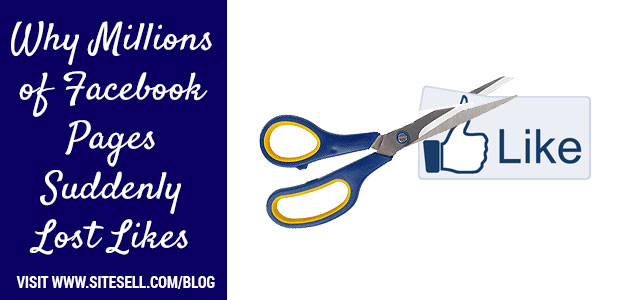I felt a great disturbance in the Force, as if millions of voices suddenly cried out in terror and were suddenly silenced. I fear something terrible has happened.Obi Wan Kenobi
On Monday, March 16th, Facebook Page owners everywhere woke up to some startling news. Those carefully cultivated and acquired fans powering that all-important metric Page Likes were somehow diminished. Suddenly, business owners had fewer fans than just the day before.
As Mari Smith put it, “And, just like that, my Facebook likes dropped by almost 3,000. Sigh. Oh well.”
What happened? And more importantly, what does it matter? Was this the destruction of Alderaan, or something far more insidious? Or, perhaps, was this an adjustment that has actual meaning and benefits to businesses and Page owners?
Let’s find out.
What Happened To My Facebook Page Likes?
Ok, so first things first, why did most of us lose fans of our Facebook Pages? The simple answer is that it was an adjustment on the part of Facebook in how Page Likes are counted. Profiles that have been memorialized or deactivated no longer count.
In an announcement earlier, on March 5th, Facebook explained. “Removing inactive Facebook accounts from Page audience data gives businesses up-to-date insights on the people who actively follow their Page and makes it easier for businesses to find people like their followers through tools like lookalike audiences.”
Let’s clarify what “memorialized or deactivated” means, and then we’ll get back to Facebook’s statement.
“Memorialized” Facebook profiles or accounts are those for people who have passed away. They’ve specifically followed Facebook’s guidelines for providing what’s called a Legacy contact – someone who can essentially let Facebook know that they’re gone. In that event, the profile becomes locked and the word Remembering is displayed next to their name. Friends and family can then post their thoughts and memories to the person’s wall.
“Deactivated” refers to when someone wants to stop using Facebook, but considers it might be temporary and doesn’t want to completely delete the account. Deactivated accounts can then be reactivated at any time.
So, for all practical purposes, these two account states represent profiles that are no longer actively using Facebook.
Which means that out of all your total Facebook Page Likes, before now, there were some profiles counted which could never have interacted with your Page or engaged with your posts. This resulted in inaccurate metrics, so that’s what Facebook was attempting to correct.
Do note that technically, Facebook is not removing the Page Like from the profile, it’s just not counted or displayed with the rest of your fans. Therefore, if a previously deactivated account were to be reactivated, the Page Like should remain.
Has Facebook Ever Culled Fans Before?
This is actually not a new event, nor is it unique to Facebook. All of the social networks, at one time or another, go through internal housekeeping and culling phases.
Typically, efforts are put toward completely removing accounts which have been identified as fake or inactive. This helps reduce bloat within network databases and servers, and again, helps make analytics and business metrics more accurate (which we’ll discuss in more detail momentarily).
For instance, in 2012, Facebook launched a new effort to remove any Page Likes that were gained through a violation of Facebook’s TOS. It was widely discussed since it included efforts to remove Page Likes that were purchased outside of Facebook from third-party providers. Ostensibly, to help protect businesses from fake Likes. While there’s still debate over Facebook’s motivations (since Facebook’s TOS only permits the purchase of Page Likes directly from Facebook), there can be no doubt that a fake fan is a worthless fan.
Google+ performed a similar culling last year, resulting in dips in connections for many users.
These kinds of adjustments should therefore be considered normal, and no cause for undo alarm. And rest assured, this will come up again and again. As the bard once said, “Changes to social networks are as constant as the rising sun.”
How Were Some Pages Affected?
In Mari Smith’s post linked above, she mentions that she lost nearly 3,000 fans out of 148,000, or about 1.8%.
SiteSell dropped from 411,636 to 396,071 overnight. A 3.8% drop.
And this is in line with what we’re seeing across the board. Most Facebook Pages lost between 1 – 5% of their Page Likes by Monday morning.
The relative age of your Facebook Page and number of fans definitely plays a factor, since the longer your Page has been around, the more likely it is that you had fans who have passed away or lost interest in using Facebook.
Since these accounts were not removed, only their inclusion in Page Like totals was affected, that means that personal profile or Facebook Group metrics remained unchanged. If you’re using a profile or Group for business, do keep that in mind. While some may say you “dodged a bullet” and were unaffected by this update, the reality is that you still have a problem (more than one, actually, since you can’t run ads and have no access to metrics at all).
Should Business Owners Be Concerned?
The bottom line here is that this is supposed to be a positive adjustment for businesses.
People who are clearly no longer using Facebook can no longer be counted in your total Page Likes. While that means you likely suffered a dip in Page Likes, it also means that when Facebook is tabulating ratios like Reach and Engagement, those inactive users are no longer counted against you.
It’s exactly like walks in baseball. Normally, a hitter’s batting average is a simple calculation of how many hits he got compared to how many times he came to the plate. If he gets one hit out of four at bats in a game, that’s a 25% average or, as written in classic baseball boxscores, a .250 average. If, however, during one of those at bats the hitter was able to draw a walk and advance to first base, that at bat no longer counts against his total. He now has one hit in three at bats giving him a .333 average on the day.
Inactive Facebook users will no longer negatively impact your metrics within Facebook Insights, and so businesses will now have a slightly improved perception of actual performance on the network.
After the initial dip in Page Likes, the calculation change remains in effect real-time going forward. Which means that any time someone deactivates their account, any Pages that they’ve Liked will drop by 1 fan.
What’s unfortunate for businesses is that we don’t know why we lose a Page Like. While the hit on March 13th was pretty obvious, if you lose a couple fans tomorrow due to deactivated accounts, you won’t know that. It’ll just look like you lost two fans and it’s more likely that you’ll assume it’s because they lost interest in your Page.
Be that as it may, this is ultimately a good idea on Facebook’s part, and business owners should not be concerned. No one outside of your business pays any attention at all to your number of Facebook fans, and certainly wouldn’t notice a loss of 3%. While I think it’s important to monitor fan totals and social media activity from a trend perspective, thinking that you need higher numbers just to look good is a vanity analysis (I know, some people call that a “Vanity Metric” and we’ll get into the difference between Vanity Metrics and Vanity Analysis another time).
Drop us a comment below with your Facebook Page and how many fans you lost. And I’d love to hear whether you agree or not that this was actually good for business!
Subscribe to our newsletter for more articles such as this!
Latest posts by Mike Allton (see all)
- How to Avoid Failure in an Entrepreneurial Business - September 23, 2019
- How to Use Buffer for Social Media Management: The Solopreneur’s Guide - September 15, 2019
- Wix Review: An In-Depth Comparison of 10,000 Websites - September 1, 2019


